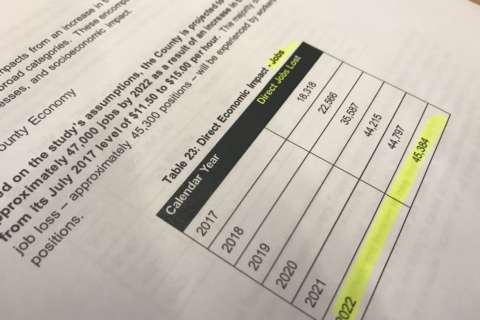ROCKVILLE, Md. — The Montgomery County Council has tried to increase the county’s minimum wage to $15 per hour before. The most recent attempt made it to County Executive Isiah “Ike” Leggett’s desk, but was vetoed, and the council came one vote short of an override.
Defeated but not daunted, the county council is trying again.
But the council’s Health and Human Services Committee has voted 2-to-1 to amend the bill for a slower rollout, phasing in the increase by the year 2022 (2024 for small businesses) instead of the year 2020.
“If we want to get to yes, this is a path forward that gets us there,” said County Council President Roger Berliner during a committee hearing Monday. “We do need to get to $15 an hour. This debate has always been about the pace with which we get there.”
It’s a plan backed by Leggett, but one that’s too slow for some members of the council, and potentially enough members who may be able to speed up the implementation of the hike.
“No, I’m not OK with the change,” said Councilman Marc Elrich. “It’s nonsense. “I’m going to try to change the bill” back to an implementation by the year 2020.
Elrich added: “I think this is irresponsible. What [Legget’s] saying is that it’s OK for poor people to stay poor, and stay poor longer. What he doesn’t tell you is if you wait until 2024 — if inflation is 3 percent — just for those last two years, $15 is only worth $14.10 compared to what it’d be worth in 2022. He’s actually offering a lower effective wage to people … it’s a big difference.”
For the increase to happen by the year 2020, backers of that deadline would need to find a sixth vote to override a threatened veto from Leggett. Councilman Craig Rice has hinted he could switch, provided certain conditions were met.
During the committee hearing, Rice made clear he was concerned with the unemployment rate among minorities in the county, noting that while the higher minimum wage is great for those who have jobs, boosting the minimum wage won’t do anything for those who don’t.
While he backs the measure, he said it’s important that the county fund certain programs aimed at improving opportunities for minorities. And if enough funding is included, he could be swayed to implement the increase by 2020.
“It’s going to be tough,” said Rice, about getting the needed funding. “And it’s really going to be a slog in terms of understanding what mitigating factors are out there. I’m going to be continuing to push my colleagues. You’ve heard some of them say that they’d support something like that moving forward, but what does that mean?”
Rick said he would also push for more funding of some programs targeting at-risk youth that he says were once on the chopping block.
“It’s quite expensive,” said Rice, but he stressed there’s a real need. “That’s going to require significant amounts of investment and I’m not really sure my colleagues are ready to move forward with that right now.”
But if the council succeeds in changing the implementation back to 2020, Councilman Tom Hucker said there’s another deadline looming that could lead to a veto-proof majority backing the quicker path.
“We’re getting closer to the election every day,” says Hucker. “The public is so overwhelmingly in favor of this bill.”
Both Hucker and Elrich say Leggett’s preference for a 2022 implementation is arbitrary.
“There’s nothing magic about 2022 or 2023 or 2024,” Hucker said. “You could just pick a number out of the air with no rationale for it and just say, ‘That’s something I’ll support.’”
Hucker added: “Nobody should be forced in Montgomery County to work two and three minimum wage jobs just to feed their families and for the county executive to just pick arbitrary deadlines ignores the fact there are tens of thousands of families that need this kind of relief … right away.”








